2022 Dahod International Scholar, Pilot Grant Awards Announced
In August 2008, Shamim Dahod (CGS’76, CAS’78, MED’87) and her husband Ashraf gave $10.5M to BUSM to establish the Shamim and Ashraf Dahod Breast Cancer Research Center, as well as these programs and endowments.
2022 Dahod International Scholar
 Jingyi Zhao, PhD, a postdoc in Dr. Mikel Garcia-Marcos’ laboratory, will characterize a small molecule inhibitor of a novel signaling mechanism that promotes breast cancer metastasis. He has identified a promising candidate molecule, named IGGi-11, that disrupts a protein signaling complex specifically present in metastatic cancer cells. He intends to further confirm the specificity of this molecule in preventing cancer cell invasiveness without overt cytotoxic effects in normal cells, and to work towards developing analog compounds with improved properties in preclinical breast cancer models.
Jingyi Zhao, PhD, a postdoc in Dr. Mikel Garcia-Marcos’ laboratory, will characterize a small molecule inhibitor of a novel signaling mechanism that promotes breast cancer metastasis. He has identified a promising candidate molecule, named IGGi-11, that disrupts a protein signaling complex specifically present in metastatic cancer cells. He intends to further confirm the specificity of this molecule in preventing cancer cell invasiveness without overt cytotoxic effects in normal cells, and to work towards developing analog compounds with improved properties in preclinical breast cancer models.
Dahod Pilot Grant Awardees
 Daniel Dempsey, PhD, assistant professor of dermatology, will collaborate with William Fairfield Warren Distinguished Professor of Biochemistry Catherine Costello, PhD, and Associate Professor of Pathology & Laboratory Medicine and Ophthalmology Nader Rahimi, PhD, to develop new chemical biology tools to dissect the role of protein modifications in promoting breast cancer to precisely quantitate abnormally modified proteins and define a mechanistic purpose for these changes. Unraveling these mechanisms will identify new vulnerabilities that may be exploited with novel therapeutics to treat patients with breast cancer.
Daniel Dempsey, PhD, assistant professor of dermatology, will collaborate with William Fairfield Warren Distinguished Professor of Biochemistry Catherine Costello, PhD, and Associate Professor of Pathology & Laboratory Medicine and Ophthalmology Nader Rahimi, PhD, to develop new chemical biology tools to dissect the role of protein modifications in promoting breast cancer to precisely quantitate abnormally modified proteins and define a mechanistic purpose for these changes. Unraveling these mechanisms will identify new vulnerabilities that may be exploited with novel therapeutics to treat patients with breast cancer.
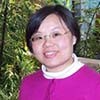 Hui Feng, MD, PhD, associate professor of pharmacology and medicine, will study what nutrients metastatic triple-negative breast cancer (TNBC) cells use to spread to other organs and how they manage to survive in a harsh environment different from the mammary gland. Understanding the metabolic dependence of these cancer cells can facilitate the identification of effective therapeutic approaches to halt the growth of metastatic tumor cells and thus expand the life span of patients.
Hui Feng, MD, PhD, associate professor of pharmacology and medicine, will study what nutrients metastatic triple-negative breast cancer (TNBC) cells use to spread to other organs and how they manage to survive in a harsh environment different from the mammary gland. Understanding the metabolic dependence of these cancer cells can facilitate the identification of effective therapeutic approaches to halt the growth of metastatic tumor cells and thus expand the life span of patients.
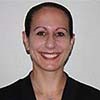
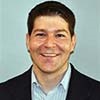 Rachel Flynn, PhD, and Neil Ganem, PhD, associate professors of pharmacology and medicine, will study mechanisms of DNA replication that are unique to human mammary epithelial cells that have undergone a whole-genome doubling. Because genetically unstable tetraploid cells are a major contributor to breast cancer development, this work may suggest new therapeutic strategies to specifically impair DNA replication in whole genome-doubled breast cancer cells while sparing normal cells.
Rachel Flynn, PhD, and Neil Ganem, PhD, associate professors of pharmacology and medicine, will study mechanisms of DNA replication that are unique to human mammary epithelial cells that have undergone a whole-genome doubling. Because genetically unstable tetraploid cells are a major contributor to breast cancer development, this work may suggest new therapeutic strategies to specifically impair DNA replication in whole genome-doubled breast cancer cells while sparing normal cells.
 Alla Grishok, PhD, associate professor of biochemistry, studies the oncoprotein DOT1L, which is essential for triple negative breast cancer progression. DOT1L, localized to the nucleus, activates many genes driving uncontrolled cell divisions. The Grishok lab will study how different parts of the large DOT1L protein work together to activate cancer-promoting genes. This mechanistic work may suggest new approaches to inhibit DOT1L, a promising drug target for cancer treatment.
Alla Grishok, PhD, associate professor of biochemistry, studies the oncoprotein DOT1L, which is essential for triple negative breast cancer progression. DOT1L, localized to the nucleus, activates many genes driving uncontrolled cell divisions. The Grishok lab will study how different parts of the large DOT1L protein work together to activate cancer-promoting genes. This mechanistic work may suggest new approaches to inhibit DOT1L, a promising drug target for cancer treatment.
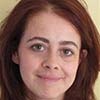 Valentina Perissi, PhD, associate professor of biochemistry, will study the molecular mechanism of PARP1 inhibition in human breast cancer cells. Poly-ADP ribosyltransferase inhibitors (PARPi) have emerged as promising drugs for the treatment of triple negative breast cancer and metastatic breast cancer. Understanding how PARP activity is endogenously restricted in cells will assist in determining the dosage of current PARPi, their efficacy in combination with other treatments, and the design of novel inhibitors.
Valentina Perissi, PhD, associate professor of biochemistry, will study the molecular mechanism of PARP1 inhibition in human breast cancer cells. Poly-ADP ribosyltransferase inhibitors (PARPi) have emerged as promising drugs for the treatment of triple negative breast cancer and metastatic breast cancer. Understanding how PARP activity is endogenously restricted in cells will assist in determining the dosage of current PARPi, their efficacy in combination with other treatments, and the design of novel inhibitors.
 Jessica Petrick, MPH, PhD, assistant professor of medicine, will use data and samples from the Black Women’s Health Study to see if inflammation-related biomarkers are associated with an increased breast cancer risk in Black women, who have the highest breast cancer mortality rate of any racial or ethnic group in the U.S. Black Americans experience a disproportionately high burden of psychosocial distress due to individual and systemic racism. Experiences of racism are associated with increased inflammation in Black Americans, which may in turn influence risk of cancer and other chronic illnesses.
Jessica Petrick, MPH, PhD, assistant professor of medicine, will use data and samples from the Black Women’s Health Study to see if inflammation-related biomarkers are associated with an increased breast cancer risk in Black women, who have the highest breast cancer mortality rate of any racial or ethnic group in the U.S. Black Americans experience a disproportionately high burden of psychosocial distress due to individual and systemic racism. Experiences of racism are associated with increased inflammation in Black Americans, which may in turn influence risk of cancer and other chronic illnesses.
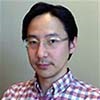 Hiroshi Tokuo, MD, PhD, research assistant professor of physiology & biophysics, will study how stromal cells communicate with breast cancer cells. Cancer cells are connected with immune cells through tunneling nanotubes, which support mitochondrial transfer. He will use in vitro and in vivo tumor models to see how these connections are established and single-cell RNA sequencing analysis to determine how mitochondrial transfer metabolically empowers the cancer cells and depletes the immune cells.
Hiroshi Tokuo, MD, PhD, research assistant professor of physiology & biophysics, will study how stromal cells communicate with breast cancer cells. Cancer cells are connected with immune cells through tunneling nanotubes, which support mitochondrial transfer. He will use in vitro and in vivo tumor models to see how these connections are established and single-cell RNA sequencing analysis to determine how mitochondrial transfer metabolically empowers the cancer cells and depletes the immune cells.
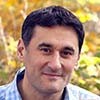 Bob Varelas, PhD, associate professor of biochemistry, will collaborate with Stefano Monti, PhD, associate professor of medicine and biostatistics, to define and understand tumor-stromal signaling networks in triple negative breast cancer. The study will use knowledge gained from network structure analyses of high-dimensional data obtained from human breast cancers to determine how stromal-epithelial signaling hubs influence cell plasticity and aggressive phenotypes using in vivo and ex vivo tumor models to identify vulnerable targets for therapeutic translation.
Bob Varelas, PhD, associate professor of biochemistry, will collaborate with Stefano Monti, PhD, associate professor of medicine and biostatistics, to define and understand tumor-stromal signaling networks in triple negative breast cancer. The study will use knowledge gained from network structure analyses of high-dimensional data obtained from human breast cancers to determine how stromal-epithelial signaling hubs influence cell plasticity and aggressive phenotypes using in vivo and ex vivo tumor models to identify vulnerable targets for therapeutic translation.
View all posts